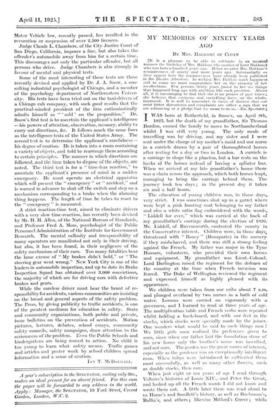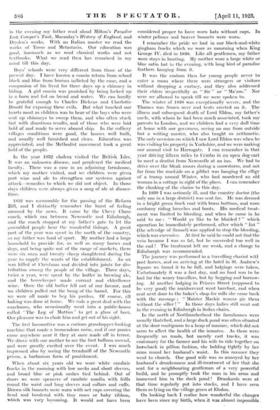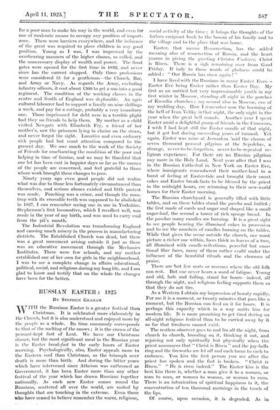MY MEMORIES OF NINETY YEARS AGO
BY MRS. HALDANE OF CLOAN
[It is a pleasure to be able to celebrate in an unusual manner the birthday of Mrs. Haldane (the mother of Lord Haldane) who was born a hundred years ago. Below wo print Mrs. Haldane's reminiscences of ninety and more years ago. Substantially as they appear here the reminiscences have already been published in the Dundee Advertiser. in wishing Mrs. Ilaldtre much happiness still to come we must congratulate her on the vivacity of her recollections. Few persons thirty years junior to her see things that happened long ago with anything like such precision. Above all, it is encouraging to find that she is no praiser of past times ; she believes that everyone and everything have, on the whole, improved. It is well to remember in times of distmss that our most bitter discontents and complaints are either a sign that we are advancing or a pledge that we mean to do so.—En. Spectator.] IWAS born at Rotherfield, in Sussex, on April 9th, 1825, but the death of my grandfather, Sir Thomas Burdon, caused the family to move to Northumberland whilst I was still very young. The only mode of travelling was by driving, and my sister and I were sent under the charge of my mother's maid and our nurse in a curricle drawn by a pair of thoroughbred horses after resting for a day or two in London. A curricle is a carriage in shape like a phaeton, but a bar rests on the backs of the horses instead of having a splinter bar.
When we arrived at my late grandfather's house there was a chain across the approach, which both horses leapt, managing to bring the carriage behind them. The journey took ten days ; in the present day it takes six and a half hours.
The education of young children was, in those days,.
very strict. I was sometimes shut up in a garret where were kept a pink hunting coat belonging to my father and also a white satin flag embroidered with the words, " Liddell for ever," which was carried at the back of my grandfather's carriage during the election of 1826.
Mr. Liddell, of Ravensworth, contested the county in the Conservative interest. Children were, in those days, threatened with " Boney " (Bonaparte) in the nursery if they misbehaved, and there was still a strong feeling against the French. My father was major in the Tyne Hussars, volunteers, who provided their own horses and equipment. My grandfather was Licut.-Colonel.
Lord Darlington raised the regiment for the defence of the country at the time when French invasion was feared. The Duke of Wellington reviewed the regiment and expressed himself as highly pleased with its appearance.
We children were taken from our cribs about 7 a.m. and plunged overhead by two nurses in a bath of cold water. Lessons were carried on vigorously with a governess, and I learned to read at three years of age. The multiplication table and French verbs were repeated whilst holding a back-board, and with our feet in the stocks, which stocks were specially made by the joiner. One wonders what would he said to such things now We little girls soon realized the preference given to sons, since when our father laid the foundation stone of his new house only the brother's name was inscribed, and not ours. The garden was the great source of interest, especially as the gardener was an exceptionally intelligent man. When tulips were introduced he cultivated them most successfully, as well as many other flowers, such as double stocks, then rare.
When just eight or ten years of age I read through Voltaire's histories of Louis XIV., and Peter the Great, and looked up all the French words I did not know and wrote them out. A little later there was read aloud to us Hume's and Smollett's history, as well as Buchanan's, Rollin's, and others ; likewise Mitford's Greece ; while in the evening my father read aloud Milton's Paradise Lost, Cowper's Task, Macaulay's History of England, and Drvden's works. With an Italian master we read the works of Tasso and Metastasio. Our education was good, inasmuch as we read classical works and not textbooks. What we read then has remained in my mind till this day.
Boys' schools were very different from those of the present day. I have known a cousin return from school black and blue from bruises inflicted by the cane, and a companion of his lived for three days up a chimney in hiding. A girl cousin was punished by being locked up in a barn and fed on bread and water. We can hardly be grateful enough to Charles Dickens and Charlotte Bronte for exposing these evils. But what touched our hearts most as children was to hear of the boys who were sent up chimneys to sweep them, and who often stuck fast with disastrous results, and of those who were laid hold of and made to serve aboard ship. In the colliery villages conditions were good, the houses well built, and usually well furnished and clean. Education was appreciated, and the Methodist movement took a great hold of the people.
In the year 1832 cholera visited the British Isles. It was an unknown disease, and perplexed the medical faculty. There was a case in an adjoining farmhouse, which my mother visited, and we children were given port wine and ale to strengthen our systems against attack—remedies to which we did not object. In those days children were always given a mug of ale at dinner- time.
1832 was memorable for the passing of the Reform Bill, and I distinctly remember the burst of feeling aroused by the news. It came by the Chevy Chase coach, which ran between Newcastle and Edinburgh, and the coach stopped at my father's gate to let the assembled people hear the wonderful tidings. A great part of the year was spent in the north of the country, as my father was fond of sport. My mother had a large household to provide for, as well as many horses and dogs, and being quite out of the range of markets, there were six oxen and twenty sheep slaughtered during the year to supply the wants of the establishment. An ox was killed at Christmas and divided into joints for dis- tribution among the people of the village. Three days, twice a year, were spent by the butler in brewing ale, and the housekeeper made currant and elderllower wine. Once the old butler fell out of our favour, and we children pulled out the bung of the barrel. For this we were all made to beg his pardon. Of course, all baking was done at home. We rode a great deal with the coachman, who occasionally went into a public-house called ' The Leg of Mutton ' to get a glass of beer. Our pleasure was to elude him and get out of his sight.
The first locomotive was a curious grasshopper-looking machine that made a tremendous noise, and if our ponies came anywhere near it they at once made off in terror. We drove with our mother to see the first balloon ascend, and were greatly excited over the event. I was much impressed also by seeing the treadmill of the Newcastle prison, a barbarous form of punishment.
When about six years old we wore white cambric frocks in the morning with low necks and short sleeves, and broad blue or pink sashes tied behind. Out of doors we wore spencers of cambric muslin with frills round the waist and long sleeves and collars and cuffs. Drawn silk bonnets were worn with net.caps covering the head and bordered with tiny roses or baby ribbon, which was vory becoming. It would not have been considered proper to have worn hats without caps. In winter pelisses and beaver bonnets were worn.
I remember the pride we had in our black-and-white gingham frocks which we wore as mourning when King George IV. died in 1830. Like all gentlemen, my father wore stays in hunting. My mother wore a large white or blue satin hat in the evening, with long bird of paradise feathers hanging from it.
It was the eastern then for young people never to enter a room where there were strangers or visitors without dropping a curtsey, and they also addressed their elders respectfully as " Sir " or " Ma'am." Nor were we allowed to speak till we were spoken to.
The winter of 1838 was exceptionally severe, and the Thames was frozen over and tents erected on it. The illness and subsequent death of Lord Eldon, my father's uncle, with whom he had been much associated, took my parents to London, and we children had a very dull time at home with our governess, seeing no one from outside but a writing master, who also taught us arithmetic. The only occasion on which I saw Lord Eldon was when he *as visiting his property in Yorkshire, and we were making our annual visit to Harrogate. I can remember in that year driving fifteen miles to Combo in an open dog-cart to meet a dentist from Newcastle at an inn. We had to drive over the bleak moors during a snowstorm, and not far from the roathide on a gibbet was hanging the effigy of a tramp named Winter, who had murdered an old woman in a cottage in sight of the place. I can remember the clanking of the chains to this day.
In 1839 I was seriously ill, and the country doctor (the only one in a large district) was sent for. He was dressed in a bright green frock coat with brass buttons, and wore corduroy riding breeches and boots. His medical treat- ment was limited to bleeding, and when he came in he said to me : " Would ye like to be bluided ? " which operation he immediately performed, after which " list " (the selvedge of flannel) was applied to stop the bleeding, which was excessive. At first he said he could not find the vein because I was so fat, but he succeeded too well in the end ! The treatment left me weak, and a change to Edinburgh was recommended.
The journey was performed in a travelling chariot Witt post horses, and on arriving at the hotel in St. Andrew's Square we found it to be full, and lodgings were taken. Unfortunately it was a fast day, and no food was to be had for the weary travellers, but by begging and borrow- ing. At another lodging in Princes Street (supposed to be very good) the maidservant went barefoot, and when sent next door to the baker's shop for rolls she came back with the message : " Maister Mackie wunna gie them withoot the Biller ! " In those days ladies still went out in the evening in Edinburgh in Sedan chairs.
In the north of Northumberland the farmhouses were usually thatched, and a large duck pond was often situated at the door contiguous to a heap of manure, which did not seem to affect the health of the inmates. As there were frequently no roads, but merely cart tracks, it was customary for the farmer and his wife to ride together on horseback in pillion fashion, she holding tightly by her arms round her husband's waist. In this manner they went to church. One good wife was so annoyed by her husband's drunkenness and ill-treatment of her that she sent for a neighbouring gentleman of a very powerful . build, and he promptly took the man in his arms and immersed him in the duck pond ! Drunkards were at that time regularly put into stocks, and I have seen them so lying on the village green at Elsdon.
On looking back I realise how wonderful the changes have been since my birth, when it was almost impossible . for a poor man to make his way in the world, and even for one of moderate means to occupy any position of import- ance. There were barriers everywhere, and the influence of the great was required to place children in any good position. Young as I was, I was impressed by the overbearing manners of the higher classes, so called, and the unnecessary display of wealth and power. The flood gates were opened for the first time in 1832, and never since has- the current stopped. Only three professions were considered fit for a gentleman—the Church, Bar, and Army or Navy. As regards the Army, excluding infantry officers, it cost about £500 to get a son into a good regiment. The condition of the working classes in the centre and South of England was deplorable. An agri- cultural labourer had to support a family on nine shillings a week, and pay for a cottage, probably a very insanitary one. Those imprisoned for debt were in a terrible plight had they no friends to help them. My mother as a child visited Newgate with Elizabeth Fry, a friend of her mother's, saw the prisoners lying in chains on the straw, . and never forgot the sight. Lunatics and even ordinary sick people had but scant attention compared to the present day. We owe much to the work of the Society of Friends for ameliorating the condition of the poor and helping in time of famine, and we may be thankful that our lot has been cast in happier days so far as the masses of the people are concerned, and feel grateful to those whose work brought these changes to pass.
Ninety years ago even good people did not realize what was due to those less fortunately circumstanced than themselves, and serious abuses existed and little protest was made. Poaching was a crime, and though the man- trap with its crocodile teeth was supposed to be abolished in 1827, I can remember seeing one in use in Yorkshire. Stephenson's first locomotive, which I recollect well, was made in the year of my birth, and was used to carry coal from the pit's mouth.
The Industrial Revolution was transforming England and causing much misery in the process in manufacturing districts. The Established Church was dead, but there was a great movement arising outside it just as there was an educative movement through the Mechanics Institutes. There were few schools, and my mother established one of her own for girls in the neighbourhood. I was to see a complete change in affairs educational, political, social, and religious during my long life, and I am glad to know and testify that on the whole the changes have been for the better.












































 Previous page
Previous page